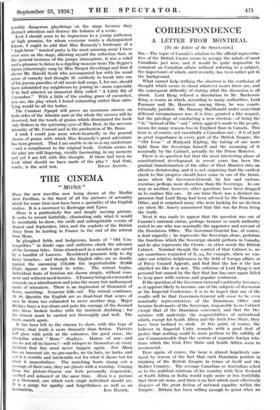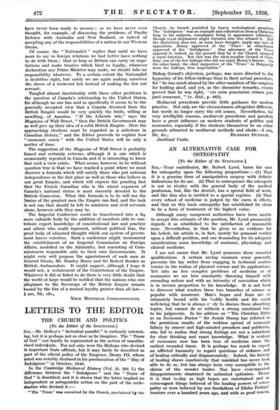CORRESPONDENCE
A LETTER FROM MONTREAL
[To the Editor of the SPECTATOR.] S1R,—The topic of Canada's relation to the official representa- tive of the British Crown seems to occupy the minds of most Canadians just now, and it would be quite impossible to comment on Canadian affairs without referring to a subject, the importance of which, until recently, has been rather put in the background.
What cannot help striking the observer is the confusion of thought which seems to cloud whatever issues there are, and the consequent difficulty of stating what the discussion is all about. Lord Byng refused a dissolution to Mr. Mackenzie King, a course in which, according to many authorities, Lord Parmoor and Mr. Bourinot among them, he was consti- tutionally justified. Mr. Ramsay MacDonald under somewhat different circumstances was, it is true, granted a like request, but the privilege of conducting a new election—of being the ‘‘ in "instead of the" out" when appeal is made to the people, means for many reasons less in England than in Canada. This issue is, of course, not essentially a Canadian one ; it is of just as great importance in every part of the British Empire, the "Old Issue" of Rudyard Kipling, the taking of one more right from the Sovereign himself and the assuming of it nominally by the Cabinet, actually by the Prime Minister.
There is no question but that the most interesting phase of constitutional development in recent years has been the gradual transformation of the office of First Minister into an effective dictatorship, and it is not surprising that the earliest check to this progress should have come in one of the Domi- nions where the Governor-General, by law and custom, exercises perhaps more discretion than the Sovereign. In one way or another, however, other questions have been dragged in to confuse this one. At one time there was a distinct im- pression that Lord Byng had been advised by the Dominions Office, and it surprised many who were looking for an election cry when Mr. Amery announced that this was far from being the truth.
Next it was made to appear that the question was one of Canada's national status, perhaps because so much authority rested in one who was nominally the appointee and servant of the Dominions Office. The Governor-General has, of course, a dual capacity ; he represents the Sovereign alone, performs the functions which the Sovereign should perform in Canada, and he also represents the Crown—in other words the British Cabinet. Nominal though the control of that Cabinet is, we are sometimes reminded of it, as, for example, when we con- sider our relative helplessness in the field of foreign affairs or of Privy Council Appeals, and find that the law is the law whether we like it or not. The criticism of Lord Byng is not personal but caused by the fact that law has once again failed to keep pace with custom and popular sentiment.
. If the question of the Governor-General's authority becomes, as it appears likely to become, one of the subjects of discussion at the Imperial Conference, it is to be hoped that one of the results will be that Governors-General will cease to be even nominally representatives of the Dominions Office and become lieutenants of the Sovereign, responsible to no Cabinet except that of the Dominion concerned, and that the Do- minions will undertake the responsibilities of nationhood which, except for South Africa and the Irish Free State, they have been inclined to shirk. At this point, of course, the believer in Imperial Unity remarks with a good deal of justice that nothing could be more perilous to the solidity of our Commonwealth than the system of separate foreign Mo- tions which the Irish Free State and South Africa seem to recommend.
Here again, of course, the issue, is almost hopelessly con- fused by reason of the fact that each Dominion persists in thinking of the British Empire in terms of itself and the Mother Country. The average Canadian or Australian asked as to the political relations of his country with New Zealand or South Africa or India would reply more or leas truthfully that there are none, and there is no fact which more effectively disposes of the great fiction of national equality within the Empire. Britain has been willing enough to grant what we
have never been ready to assume ; as we have never even thought, for example, of discussing the problems of Pacific Defence with Australia and New Zealand, or indeed of accepting any of the responsibilities of a nation in our Western Ocean.
Of course, the " Nationalist " replies that until we have more to say in foreign relations we had better have nothing to do with them ; that so long as Britain can carry on nego- tiations and make treaties which bind us legally, whatever declaration any Prime Minister may make, we should take no responsibility whatever. To a certain extent the Nationalist is doubtless right, but surely we are again making ourselves the slaves of a worn-out law instead of making the law our servant.
Tangled almost inextricably with these other problems is the question of Canada's relationship to the United States, for although no one has said so specifically it seems to be the generally accepted view that a Canada divorced from the British Empire would be very quickly the bride, willing or unwilling, of America. "If the Liberals win," says the Magazine of Wall Street, "then the British Government may as well give up their idea of a solid British Empire. Here the approaching elections must be regarded as a milestone in Canadian history," and the Editor proceeds to explain how "economic union" with the United States will be only a matter of time.
The suggestion of the Magazine of Wall Street is probably biased and certainly extreme, although it is one which is occasionally repeated in Canada and it is interesting to know that such a view exists. What seems, however, to be without question true is that we have reached a point where we must discover a formula which will satisfy those who put national independence in the first place as well as those who believe in our great Empire, and which will express the puzzling fact that the French Canadian who is the wisest exponent of Canada's national status is most sincerely devoted to the British Connexion. What this formula is to be will tax the brains of the greatest men the Empire can find, and the task is not one that should be left to ministers and civil servants alone, however able they may be.
The Imperial Conference could be transformed into a far
more valuable body by the addition of members able to con- tribute expert knowledge of constitutional law and practice and others who could represent, without political bias, the great body of educated thought which our system of govern- ment leaves voiceless. Such a conference might recommend the establishment of an Imperial Commission on Foreign Affairs, modelled on the Admiralty, but consisting of Com- missioners responsible only to their own Governments. It might very well propose the appointment of such men as General Smuts, Mr. Stanley Bruce and Sir Robert Borden as British Ambassadors. It might suggest, although I hope it would not, a restatement of the Constitution of the Empire. Whatever it did or failed to do there is very little doubt that the world at large would be notified that the nations who owe allegiance to the Sovereign of the British Empire remain bound by the ties of a mutual loyalty greater than all law.— I am, Sir, etc., YOUR MONTRF.AL CORRESPONDENT.















































 Previous page
Previous page